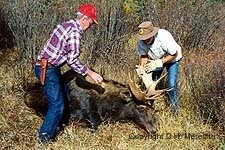Why Hunt? Part 3 (Conclusion) — The Kill
by Don H. Meredith © 1997
(first published in the November 1997 Edmonton Sports Scene
and subsequently as a complete article in the 1998 Alberta Guide to Hunting Regulations)
During any good debate about the pros and cons of hunting (where each side is willing to listen and address the points raised by the other), the argument eventually boils down to the kill. Why must hunters kill? Instead, why don't we hunt with a camera, or just be satisfied with seeing an animal? Why must we take an animal's life?
José Ortega y Gasset, the Spanish philosopher who is often quoted on this subject, perhaps said it best in his classic book, Meditations on Hunting: "One does not hunt in order to kill. On the contrary, one kills in order to have hunted." In other words, the activity of hunting is what's important, not the kill. But if killing a game animal is not your goal then you are not hunting.
When I'm photographing wildlife, I'm not hunting. Sure I'm going through similar actions — stalking an animal, trying to get close enough for one good picture. But I'm not really a part of that animal's world. I am an interloper, a visitor stealing a moment of the animal's time. There is little relationship with the animal that it understands or that improves my knowledge of my connection with it. On the other hand, when I'm hunting, I'm playing a role that both my prey and I understand all too well.
My body definitely tells me that hunting is different from other outdoor activities. Whether in anticipation of the coming hunt or during it, my excitement and awareness is higher than when I'm planning or taking a hiking trip. In a previous article in this column, I wrote about the risk of heart attacks among hunters. Most of that information came to light because of the work sociologists were doing to determine why people choose hunting over other outdoor activities. Hunters are less likely to achieve the goals of their trips than are hikers or canoeists. Yet when people who both hunt and hike or canoe are asked to rank these activities, the majority placed hunting as their first choice. The heart-rate studies sought to explain why. Hikers or canoeist rarely achieve the heart rates or excitement levels that hunters do. Why? I believe its because hunting taps that fundamental relationship we have with the natural world, a relationship that may be built into our genes, a relationship that once tapped is difficult to turn off. That relationship centers on the kill.
Conscientious hunters work hard to make sure an animal is killed as quickly and cleanly as possible. They have studied the animal's behavior, have come to know how it lives, and where it will be at certain times of the day. They may spend days working to position themselves to place one fatal shot. Such work and study forges an understanding of an animal that goes beyond simple knowledge.
When a kill is finally made, a hunter's emotions are mixed. There is the joy of success tempered by the sadness of the death of a fellow living creature. This mixture of emotions leads to some inescapable conclusions about the transience of life and the finality of death. Indeed, it is at the kill that traditional aboriginal hunters hold small ceremonies acknowledging the spirit of the animal and the life it has just given the hunters and their families. Such recognition is rarely considered for the animal that provided the steak bought at a supermarket.
I'm not advocating that everyone become a hunter. If everyone did, there wouldn't be enough game or space to go around. What I am advocating is a non-hunting public that understands and supports the right to hunt. In the past, this right was easily given from a rurally based society. Now, hunters must speak out and seek understanding from an urban society. If hunting is abolished, either by decree or lack of interest, then we would all lose an important perspective on our role in the web of life on this planet.

